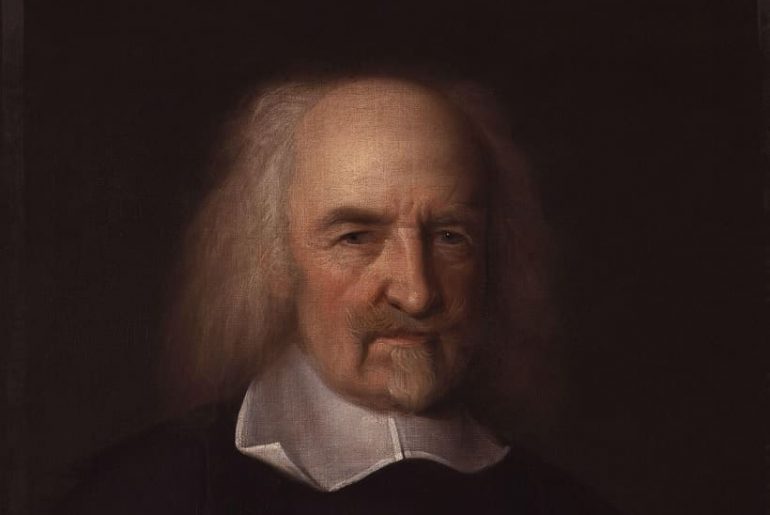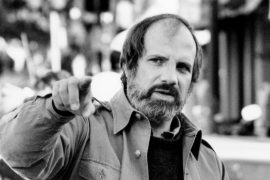THOMAS HOBBES is considered a classic of political philosophy. The son of an English pastor studied in Oxford, then worked for a long time as a tutor to the Duke of CAVENDISH and was able to devote himself to intensive scientific studies during this time. He wrote his most important work, Leviathan, in exile in Paris, which he then had to leave. Back in England, the ardent monarchist found himself exposed to hostility from the Church and, towards the end of his life, was banned from publishing.
Two sentences in particular are linked to the political philosophy of THOMAS HOBBES, who was born on April 5, 1588 in Malmesbury. They can be found in his 1651 Latin work “Leviathan” (see PDF “Thomas Hobbes – Leviathan (excerpt)”) and read:
“homo homini lupus est”
(Man is a wolf to man)
“bellum omnium contra omnes”
(war of all against all)
They condense HOBBES’ deeply pessimistic view of man, which caused him to turn away from the medieval conception of society, which was based on the agreement of the individual and the state with a given divine order of salvation. HOBBES’ materialistic view of things (of nature and man), on the other hand, was based on the new scientific understanding of the world, which was decisively shaped by BACON, GALILEI, GASSENDI and DESCARTES.
From his life
The young HOBBES grew up as the son of a minister in the English countryside, but enjoyed an excellent education, with a focus on ancient languages. By the age of six he had mastered Latin and ancient Greek. He attended a private school and then studied at Oxford University. There he obtained his teaching license and in 1607 became tutor to Duke CAVENDISH OF HARDWICKE, whose son he taught. In this position he took part in the great tour of Europe, during which the duke’s family stayed mostly in France. Back in England, HOBBES – supported by the duke – was able to devote himself extensively to the study of ancient thinkers. He was particularly impressed by THUKIDIDES, which HOBBES translated into English in 1828 with the intention of warning the English of the dangers of democracy. He was also interested in the natural sciences and mathematics. HOBBES made contact with numerous scholars, became friends with the philosopher and naturalist PIERRE GASSENDI and met GALILEO GALILEI during his 1636 journey to Italy.
Government Crisis in England
A decisive turning point in his life took place when the conflict between king and parliament escalated in England. The English monarch KARL I had dissolved Parliament in 1629, but was forced to reconvene it in 1640 due to lack of funds. HOBBES vehemently represented the monarchist position and defended the king’s efforts to rule as absolutely as possible. Faced with severe hostility from Parliament, HOBBES fled to Paris, where he spent the next eleven years. Supported by influential and wealthy friends, he lived a relatively carefree and research-intensive time. In 1642 his work “De cive” was published. Immediately afterwards he worked on his next book entitled “De corpore”. In 1646 he taught mathematics to the later KARL II, who had also emigrated to Paris. Three years later, the English king CHARLES I was executed and OLIVER CROMWELL took power. At this time, HOBBES had begun preparing the work that has made it a classic of political philosophy.
About the “Leviathan”
With the title “Leviathan”, HOBBES refers to a biblical sea monster whose power and strength are also supposed to characterize the state. HOBBES gives the state the traits of a surrogate god who is as necessary as he is mortal. The famous cover of Leviathan shows the body politic as an all-powerful figure formed from the bodies of its subjects. For HOBBES, people need an unlimited ruler because without him, in the state of nature, they would ruthlessly live out their egoistic needs. HOBBES therefore describes the state of nature as a war of all against all, in which the stronger prevails. Fearing the strength of others, people seek refuge in a supreme power to which all submit in order to preserve their lives. The state order is based – at least implicitly – on a social contract with which the citizens cede their power to the state for the sake of self-preservation.
When the anti-church tendencies of “Leviathan” became known in France, HOBBES was threatened with prosecution there, so he returned to England. As soon as he arrived, he engaged in a dispute lasting several years with JOHN BRAMALL, the Bishop of Derry, which mainly revolved around the question of free will. HOBBES firmly denied that free will exists. In his view, man was completely shaped by his natural drives and passions and, as a selfish being, was only concerned with his own advantage. After the end of Cromwell’s dictatorship, the former student of HOBBES’ CHARLES II ascended the English throne in 1660. He defended HOBBES against the hostilities of the church, but in 1666 he was banned from publication. At the age of 68, HOBBES published his English translations of HOMER’s Iliad and Odyssey. Only two years after his death on December 4, 1679 did his last major work, the “Behemoth”, appear.
Selection of his writings
Elements of Law, 1640
De Cive, 1642
Leviathan, 1651, see PDF “Thomas Hobbes – Leviathan (excerpt)”
Of Liberty and Necessity, 1654
De Homine, 1657
De Corpore, 1665
Behemoth, 1682
How did Thomas Hobbes become famous?
Thomas Hobbes (5 April 1588 Westport, Wiltshire – 4 December 1679 Hardwick Hall, Derbyshire) was an English mathematician, political theorist and philosopher. He became known for his major work Leviathan, in which he developed a theory of absolutism.
How does Hobbes establish morality?
Thomas Hobbes, a classic of philosophical ethics, proposes an answer: A strong state is the condition for peace and thus for morality.
How does Hobbes see man in the state of nature?
Thus, for Hobbes and Hegel, in a post-natural state, human beings live in a society closer to their most elementary essence than the natural state, and therefore experience greater contentment.
What does war mean to Hobbes?
With the theory of the “war of all against all”, Hobbes postulated that man in the state of nature would not live peacefully with his fellow man. According to the considerations preceding Leviathan, everyone must ultimately make his own life absolute – if he loses it, he loses everything he owns.
Who said man is man’s wolf?
The saying was made famous by the English state theorist and philosopher Thomas Hobbes, who used it in the dedication of his work De Cive to William Cavendish, Earl of Devonshire.
What kind of human image does Thomas Hobbes have?
According to Hobbes, man is characterized by three mainsprings: desire, fear and reason; none of these three components make him seek the company of others for something else unless it is for his own benefit.
What does the word Leviathan mean?
Leviathan (Hebrew לִויָתָן liwjatan “the winding one”) is a cosmic sea monster from Jewish mythology. Its description contains features of a crocodile, a dragon, a snake or a whale. Leviathan is to be defeated by God at the end of the world.
Who is the dragon in the Bible?
Tannin (Hebrew “dragon”) is often translated as “sea monster”, “monster” or “snake”. Tannin is the primeval “dragon” who lives in the sea like Leviathan and is shattered by YHWH. A parallel with the same meaning can be found in the Old Testament with Isaiah.
How do you kill a leviathan?
Decapitation – If their heads are cut off and they are far from the body, they will no longer be able to regenerate. Bones of a righteous dead man, washed with the blood of the three fallen – The only weapon capable of truly killing a Leviathan.
What did thomas hobbes believe in?
Hobbes believes that moral judgments about good and evil cannot exist until they are decreed by a society’s central authority. This position leads directly to Hobbes’s belief in an autocratic and absolutist form of government.
Which statement best characterizes the ideas of thomas hobbes?
This is Expert Verified Answer. The statement that best characterizes the ideas of Thomas Hobbes is that people are naturally selfish and violent.
According to thomas hobbes, what is the purpose of government control over citizens?
According to Thomas Hobbes, the purpose of government control is to ensure that peace persists in society. Through an agreement known as a ‘social contract’, Hobbes suggests that people should give absolute power to a ruling party or individual.





